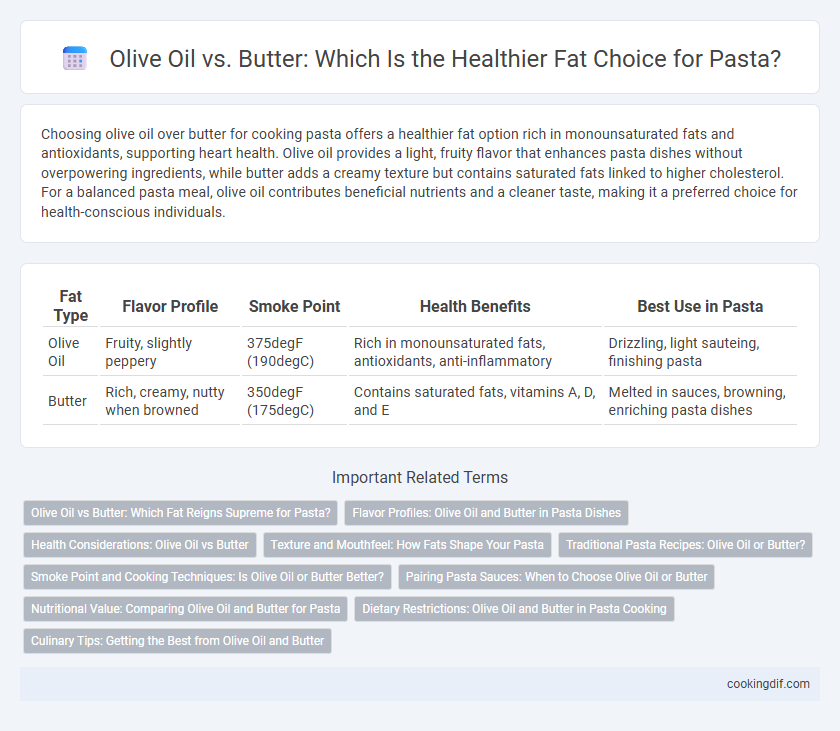Choosing olive oil over butter for cooking pasta offers a healthier fat option rich in monounsaturated fats and antioxidants, supporting heart health. Olive oil provides a light, fruity flavor that enhances pasta dishes without overpowering ingredients, while butter adds a creamy texture but contains saturated fats linked to higher cholesterol. For a balanced pasta meal, olive oil contributes beneficial nutrients and a cleaner taste, making it a preferred choice for health-conscious individuals.
Table of Comparison
| Fat Type | Flavor Profile | Smoke Point | Health Benefits | Best Use in Pasta |
|---|---|---|---|---|
| Olive Oil | Fruity, slightly peppery | 375degF (190degC) | Rich in monounsaturated fats, antioxidants, anti-inflammatory | Drizzling, light sauteing, finishing pasta |
| Butter | Rich, creamy, nutty when browned | 350degF (175degC) | Contains saturated fats, vitamins A, D, and E | Melted in sauces, browning, enriching pasta dishes |
Olive Oil vs Butter: Which Fat Reigns Supreme for Pasta?
Olive oil is rich in monounsaturated fats and antioxidants, enhancing pasta dishes with a fruity, robust flavor while supporting heart health. Butter offers a creamy texture and richer taste but contains higher saturated fats, which may impact cholesterol levels. For a balanced, flavorful pasta experience, olive oil generally provides a healthier and more versatile fat option than butter.
Flavor Profiles: Olive Oil and Butter in Pasta Dishes
Olive oil imparts a fruity, slightly peppery flavor that enhances the natural taste of pasta and ingredients like garlic and herbs. Butter delivers a rich, creamy, and slightly sweet taste, creating a luxurious mouthfeel that complements cheese and vegetables. Choosing between olive oil and butter depends on the desired flavor profile, with olive oil offering freshness and butter adding indulgence.
Health Considerations: Olive Oil vs Butter
Choosing olive oil over butter for pasta dishes enhances heart health due to olive oil's high content of monounsaturated fats and antioxidants. Butter contains saturated fats, which can raise LDL cholesterol levels and increase the risk of cardiovascular disease when consumed in excess. Olive oil also provides anti-inflammatory benefits and supports better cholesterol profiles, making it the healthier fat choice for pasta preparation.
Texture and Mouthfeel: How Fats Shape Your Pasta
Olive oil imparts a silky, smooth texture to pasta, enhancing its natural flavors with a light, fruity mouthfeel that coats each strand without heaviness. Butter provides a rich, creamy texture that creates a luscious, velvety mouthfeel, adding depth and indulgence to the dish. Choosing between olive oil and butter for pasta fat influences the overall sensory experience, with olive oil offering a fresher, more delicate finish and butter delivering a warm, satisfying richness.
Traditional Pasta Recipes: Olive Oil or Butter?
Traditional pasta recipes often favor olive oil due to its rich flavor and health benefits, including high levels of monounsaturated fats and antioxidants like vitamin E. Butter provides a creamy texture and distinct taste but contains higher saturated fat, which can influence heart health negatively if consumed in excess. Olive oil's versatility and Mediterranean roots make it the preferred fat in countless classic Italian dishes, enhancing pasta without overpowering natural flavors.
Smoke Point and Cooking Techniques: Is Olive Oil or Butter Better?
Olive oil, with a higher smoke point of around 375-420degF (190-215degC), is ideal for sauteing pasta ingredients and preparing sauces that require moderate heat without burning. Butter, having a lower smoke point of about 350degF (175degC), imparts rich flavor but is best used for finishing dishes or low-heat cooking to prevent browning and bitterness. Choosing olive oil or butter depends on cooking techniques: use olive oil for high-heat searing and butter for creamy, delicate pasta dishes.
Pairing Pasta Sauces: When to Choose Olive Oil or Butter
Olive oil enhances pasta sauces with its fruity, peppery notes, making it ideal for tomato-based, vegetable, or seafood dishes that benefit from a lighter, Mediterranean flavor profile. Butter adds a rich, creamy texture perfect for buttery, wine-based, or cream sauces like Alfredo or carbonara, providing a smooth mouthfeel and depth. Choosing olive oil or butter depends on the sauce's flavor intensity and desired mouth-coating richness in traditional Italian pasta pairings.
Nutritional Value: Comparing Olive Oil and Butter for Pasta
Olive oil contains monounsaturated fats and antioxidants that promote heart health and reduce inflammation, making it a nutritious choice for pasta dishes. Butter, rich in saturated fats and cholesterol, can raise LDL cholesterol levels but also provides fat-soluble vitamins like A, D, and E. Choosing olive oil over butter enhances the nutritional profile of pasta by delivering healthier fats and beneficial compounds.
Dietary Restrictions: Olive Oil and Butter in Pasta Cooking
Olive oil is a preferred fat choice for pasta cooking due to its compatibility with vegan and lactose-intolerant diets, offering a heart-healthy source of monounsaturated fats and antioxidants. Butter, rich in saturated fats and dairy components, may cause issues for individuals with lactose intolerance or dairy allergies. Choosing olive oil supports dietary restrictions while enhancing flavor and providing anti-inflammatory benefits in pasta dishes.
Culinary Tips: Getting the Best from Olive Oil and Butter
Olive oil enhances pasta dishes with its rich, fruity flavor and high antioxidant content, making it ideal for sauteing garlic or drizzling over finished plates to elevate taste and health benefits. Butter provides a creamy, indulgent texture that beautifully complements rich sauces like Alfredo or carbonara, while its milk solids add depth and a slight nuttiness when browned. Combining both fats can balance robust flavor and silky texture, optimizing pasta recipes through nuanced culinary techniques.
olive oil vs butter for fat choice Infographic

 cookingdif.com
cookingdif.com